The Bell Tolls Over Seattle, but Not for Most Commuters
It would appear as though the price of admission to traverse the longest floating bridge in the world on a daily basis has had quite the impact on commuting patterns in Seattle. A study to be issued by the U.S. Department of Transportation this week – barring another tragicomic display by the powers that be, of course – has uncovered that use of the Governor Albert D. Rosellini Bridge – Evergreen Point (colloquially known as the 520 floating bridge) has gone down by half since tolling began near the end of 2011.
The Mileage Tax Cometh: The State Giveth, The State Taketh Away
“Hybrid and electric cars are sparing the environment. Critics say they’re hurting the roads,” writes Bloomberg. “The popularity of these fuel-efficient vehicles is being blamed for a drop in gasoline taxes that pay for local highway and bridge maintenance, with three states enacting rules to make up the losses with added fees on the cars and at least five others weighing similar legislation.”
How To Avoid Brazilian Car Taxes: Build A Factory. Or A Few
The Brazilian government must have borrowed several chapters from Vladimir Putin’s playbook on industrial policy. Reuters has it that the Brazilians are using the same strong-arm tactic as Russia: Invest heavily in-country and steep taxes on imported cars will go away. Don’t invest in Brazil and kiss your bunda adeus.
Washington: More Anti-Camera Initiatives to Come
Washington State ballot initiative guru Tim Eyman vowed Wednesday to put even more pressure on municipalities he sees as dependent on automated ticketing revenue. Eyman is feeling good after voters on Tuesday rejected cameras by comfortable margins in three of three contests on Tuesday. Larger jurisdictions are now in his sights.
“For us, it’s full steam ahead,” Eyman told TheNewspaper. “I’m gung-ho to do a couple more cities and keep the ball rolling. I’ve never found a more effective way to lobby the legislature than to say, ‘You either do it, or we’re just going to pick you off one city at a time.'”
Chicago, Illinois Speed Camera Plan Could Dwarf Red Light Revenue
Sixty-one million dollars a year is a lot of money. That is the revenue Chicago’s red light camera program program generated in 2010. Based on reports from the Chicago Department of Transportation (CDOT), a proposed speed camera enforcement program being pushed by Mayor Rahm Emanuel (D) would make the city’s red light camera program look penny ante in comparison.
The Expired Meter obtained the results of three studies conducted by CDOT over the past few years which shed light on how lucrative the speed camera business could be for Chicago. Data from these reports seem to indicate that revenue from speed cameras could generate hundreds of millions of dollars in fines for a desperate, cash-strapped city.
Argentina: Want To Sell Porsches? Export Our Wine And Olives
With a 35% import tax on new cars, Argentina is already a touch market for foreign brands seeking to bring cars into the country. But the Argentinean government has just made it little bit harder by demanding that importers export an equal amount of Argentina-made goods for every car imported. As a result, Bloomberg reports that Porsche’s importer is exporting Malbec wines and olives, Mitsubishi’s importer is getting into the peanut export game, and Subaru’s representative is shipping chicken feed to Chile. BMW, which has had recent difficulties importing into Argentina, is focusing on its core business, exporting auto parts and upholstery… and a little processed rice to make up the difference. But why are these major manufacturers getting into all kinds of strange side businesses just because Argentina wants to improve its trade balance and foreign currency reserves? Simple: Argentina is South America’s second-largest economy, and it’s been growing at over 5% per year since 2007 (i.e. when other markets were shrinking). So if the government wants imports balanced with exports, well, Porsche’s importer is just going to have to get into the wine business, isn’t he?
Georgia HOT Lanes Create Congestion, Disappointment
Georgia’s introduction of high occupancy toll (HOT) lanes on Interstate 85 at the beginning of the month has already turned into a public relations disaster. During rush hour, motorists found themselves stranded in the general purpose lanes as the adjacent HOT lane — constructed and maintained with their tax dollars — were essentially unused. Drivers balked at paying the stiff $5.40 entrance tax for permission to enter, leaving the existing lane space to go to waste. Governor Nathan Deal (R) intervened swiftly on October 6 to order the State Road and Tollway Authority (SRTA) to lower the cost of using the toll lane.
Report Knocks "Big Battery" Plug-In Subsidies, Will The DOE Notice?
The main tool for the government’s crusade to get one million plug-in cars on the road by 2015 is the “Qualified Plug-In Electric Vehicle Tax Credit,” a credit that returns between $2,500 and $7,500 to purchasers of a qualifying vehicle. To qualify for the minimum $2,500 credit, a vehicle must have a traction battery with a minimum of four kW/h, and the credit adds an additional $417 in credits for every kW/h above the minimum. Why? Well, you might think that it’s because the DOE has done its research and determined that larger battery packs deliver more social benefits… at least until the 16kW/h limit (the exact size of the Chevy Volt’s battery), where the credit tops out at $7,500. But according to new research by Carnegie Mellon’s Jeremy Michalek, that basic assumption doesn’t appear to be true at all. In fact, his latest paper argues that the government would actually be better off subsidizing smaller, not larger, battery packs.
Massachusetts: Supreme Court Approves Charging Innocent Ticket Recipients
Motorists issued a traffic ticket in Massachusetts will have to pay money to the state whether or not they committed the alleged crime. According to a state supreme court ruling handed down yesterday, fees are to be imposed even on those found completely innocent. The high court saw no injustice in collecting $70 from Ralph C. Sullivan after he successfully fought a $100 ticket for failure to stay within a marked lane.
Arizona: Federal Judge Overrules Legislature on Transit Subsidies
Arizona must subsidize those who ride on buses, vans and light rail, regardless of the desire of state lawmakers or voters to do otherwise. US District Court Judge David G. Campbell on Friday overturned a state law enacted in March last year to curtail excessive spending by slashing such subsidies. The legislature canceled the Local Transportation Assistance Fund, which had doled out $127 million in taxpayer cash since 1998 to various mass transit programs using funds from the Powerball lottery.
Desperate Photo Enforcement Firms Sue Cities
Companies that operate red light cameras and speed cameras are facing increasing opposition across the country. In response, the firms have adopted a strategy of suing cities that have second thoughts about continuing to use cameras in their community. They have also been going after their own customers to collect as much revenue as possible.
On December 1, Redflex filed suit against Tempe, Arizona in Maricopa county Superior Court claiming the city owed $1.3 million in per-ticket fees for each driver mailed a photo ticket who decided to go to traffic school. The city claims it only collected $1.8 million in revenue from the program, mostly because last year’s payment rate was just 31 percent. Drivers realize in increasing numbers that tickets in the state can be ignored unless they are properly served.
California Cuts Green Car Incentive In Half
California has backed up its strict emissions standards for years now with a $5,000 tax credit for electric, hybrid and fuel cell vehicles, which when combined with a $7,000 federal tax credit can often make those vehicles nearly as affordable as “regular” cars. But, reports Automotive News [sub], that state credit has fallen victim to California’s budget woes and oversubscription, and has been cut in half from $5,000 to $2,500. According to the report:
high demand exhausted the program’s funding last month. The Los Angeles Times reported Thursday that about 500 consumers who bought electric cars such as the Nissan Leaf or Tesla Roadster are on a waiting list and will collect the $2,500 rebate.
To deal with growing demand, the pool of money to fund the rebates was increased to between $15 million and $21 million for CARB’s current fiscal year ending June 30, 2012, according to CARB’s announcement. A total of $11.1 million was allocated in the program’s first two years, according to CARB spokeswoman Mary Fricke.
The increased cash pool and lowered rebate amount are aimed at making the incentive available to more consumers, according to CARB’s Web site. The changes are projected to fund about 6,000 rebates for consumers who apply for the program on a first-come basis, Fricke said.
Now California “green car” intenders not only get a reduced tax credit, but they also don’t get free access to the HOV lane anymore. It’s almost as if California wants “green” vehicles to succeed or fail on their own terms…
Pennsylvania Court Hides Free Rides for Toll Collectors
Public employees can take rides on toll roads at taxpayer expense, but these trips are not subject to disclosure according to a ruling Tuesday by the Pennsylvania Commonwealth Court. A three-judge panel denied the freedom of information request of the Harrisburg Patriot-News for E-ZPass transponder usage information data by for employees of the Pennsylvania Turnpike. On October 21 the paper sought details on the 2000 toll collectors who do not pay for use of the road, regardless of whether the travel was job related.
Washington: Initiative Measure Targets Toll Roads
Voters in Washington state will decide in November whether to slow down the state’s push toward tolling. Initiative 1125 prohibits lawmakers from diverting toll road revenue and other levies on motorists toward non-transportation purposes. It also forces politicians to vote directly on any toll hikes.
“If there’s going to be tolls, there has to be accountability and transparency,” initiative co-sponsor Tim Eyman of Voters Want More Choices wrote in an email. “It’s simply not too much to ask for taxpayers who are being forced to pay twice for their roadway infrastructure (the highest gas tax in the nation and tolls) that the legislature be required to follow the law and abide by the Constitution.”
Massachusetts Court Denies Meaningful Right to Contest Parking Tickets
The highest court in Massachusetts believes there is no due process problem with charging motorists $300 to challenge a $5 or $15 parking ticket. On Thursday, the Supreme Judicial Court ruled that the appeal procedures in the city of Northampton satisfied constitutional requirements even though motorists were denied an in-person hearing to contest the legitimacy of a citation. The city only allowed people either to pay the fine in full or send “a signed statement explaining his objections.”
Washington: Anti-Camera Group to Shame City Council
Opponents of automated ticketing machines in Monroe, Washington have turned to a new tactic in battling a city council that refuses to give up the use of red light cameras and speed cameras. Instead of engaging the city and a wealthy traffic camera company in a costly legal battle, the group BanCams.com decided Wednesday to shame the council at every election until officials follow the public will.
Decision Overturning Houston Anti-Camera Referendum Appealed
The battle over the Houston, Texas red light camera program returned to the legal spotlight Monday. A majority of voters agreed with Francis M. Kubosh and Randall Kubosh in November that the automated ticketing machines should be removed, but a federal judge intervened earlier this month and overturned the election ( view ruling). The Kuboshes filed a reply brief with the US Court of Appeals for the Fifth Circuit Monday seeking to restore the result of the public vote.
AB 529: California's Red Light Revenue Raid
Not satisfied with impoverishing residents and unwary visitors with $500 automated tickets for being a tenth of a second late at a light, California’s legislators are moving a new bill allowing cities to reduce many posted speed limits by 5 mph. The lower limits will, in turn, allow them to shorten yellow lights, which will produce more red light camera tickets (four of the sponsoring cities have red light cameras).
Senate Proposal Would Suspend Federal Gas Tax
The average price of regular unleaded gasoline was $3.96 this week, an increase of 38 percent over the same time last year. US Senator Rand Paul (R-Kentucky) on Tuesday proposed to temporarily reduce that cost by 18.4 cent cents by suspending the federal gas tax. Under the freshman lawmaker’s plan, the highway trust fund would be replenished by reducing payments made to foreign governments.
“Let’s have a gas tax holiday,” Paul said in a floor speech. “Let’s take the money from foreign aid and let’s give it back to the American people who worked hard to earn it…. That would help people, that would lower the price of gasoline and that would be a stimulus to the economy.”
Feds Moving EV Tax Credits To "Cash For Clunkers" Model
Speaking at Nissan’s Smyrna, TN electric car factory, Transportation Secretary Ray LaHood noted that his staff is working with Congress to make federal tax credits for plug-in car purchases available as a rebate on the dealer level, saying
We’d like for people to get a $7,500 rebate on the day they buy the Leaf. We’re doing a lot of talking about it. When you give people that incentive to buy a battery-powered car, they’ll do it. We know these incentives help.
Speaking to Automotive News [sub], LaHood even went as far as to argue that the new direction for the tax credits, which were previously only claimable when filing taxes, would be successful for the reason that it would make the credits more like the Cash For Clunkers program. Apparently LaHood has completely forgotten how riddled with waste, inefficiency, fraud, confusion, delays, unintended consequences and all-purpose madness that program was. And that’s just scraping the surface. Foolish as it is to subsidize vehicles during the “fleecing the early adopters” phase of a new technology rollout (perhaps we should be saving stimulus for the inevitable “trough of disappointment”?), making those credits available at the dealer level is even worse, increasing the hype and incurring C4C-like downsides along the way.
Missouri Legislature Considers Speed Camera Expansion
Backroom dealing will determine whether speed camera use will become common in Missouri. The General Assembly yesterday agreed to convene a conference committee to iron out differences between House and Senate-passed versions of an omnibus transportation bill that cleared the state Senate on Tuesday. Among the the items up for debate is language that would allow any governmental jurisdiction to set up as many photo radar units as it pleases without any meaningful limitations on use.
White House Disowns Pay-Per-Mile Tax Plan
Hackles were raised here at TTAC and around the internet this week, when a draft version of the Transportation Opportunity Act circulated, tipping us to the administration’s preference for pay-per-mile road taxation. According to that version of the bill,
section [2218] would establish a Surface Transportation Revenue Alternatives Office within the Federal Highway Administration. The office would analyze the feasibility of implementing a national mileage-based user fee system that would convey prices to users to reflect system use and other travel externalities and serve as a funding source for surface transportation programs.
TTAC has been tracking and criticizing attempts at pay-per-mile taxation (both state and federal) since at least 2007, and because Transportation Secretary Ray LaHood had previously come out in support of pay-per-mile road taxes, we weren’t surprised by the TOA’s inclusion of a move towards pay-per-mile. And because the White House smacked LaHood down the last time he praised pay-per-mile, we aren’t all that surprised to find The Hill reporting that the White House is disavowing any interest in pay-per-mile. Spokesfolks explain:
This is not a bill supported by the administration. This was an early working draft proposal that was never formally circulated within the administration, does not take into account the advice of the president’s senior advisers, economic team or Cabinet officials, and does not represent the views of the president
So fear not, Americans opposed to a GPS tracker in every car: the White House has no interest in tracking your every movement. But until such time as a politician finds the cojones to address the highway fund’s shortfall by raising the gas tax, expect pay-per-mile to pop up again and again.
Ohio Supreme Court Defends Traffic Camera Program
Ohio’s supreme court has a long history of defending traffic tickets, whether they happen to be issued by police or a machine. The court on Wednesday maintained this tradition in tossing out a constitutional challenge to the photo enforcement hearing process, denying the challengers the chance to present their case in full.
Germany To Match Obama EV Goal… Five Years Later
President Obama’s goal of having a million plug-in vehicles zipping around American roads by 2015 faces some serious challenges, as report after report casts doubt on the chances of the hoped-for level of adoption in the hoped-for timeframe. Meanwhile, the president’s defense of his plan’s practicability… leaves quite a bit to be desired. Regardless, the President’s goal is receiving some unexpected support as Automotive News Europe [sub] reports that
Germany’s cabinet plans to commit billions of euros to boost the electric auto sector so that 1 million cars are registered by 2020
House Transportation Committee Blasts Transportation Stimulus
One of President Obama’s signature achievements, passage of $812 billion in stimulus funds at the height of the recession, was labeled a failure by the chairman of the US House Transportation Committee, which had jurisdiction over about eight percent of the projects funded. In a hearing yesterday, Representative John Mica (R-Florida) explained that the money did not end up going to needed infrastructure projects.
“This will go down in history as one of the greatest failures of a government program to stimulate the economy that mankind has ever created,” Mica said. “This is a trillion-dollar lesson.”
Missouri: County Government Erases Red Light Camera Ordinance
For Jefferson County, Missouri, it was not enough to force a red light camera company to pack its bags and leave the area. Commissioners last week wiped the books clean, unanimously repealing the ordinance adopted last summer that had authorized the use of automated ticketing machines in the unincorporated parts of the county.
“The old three-member county commission decided to implement a red light camera program using ATS as the vendor,” Councilman Bob Boyer told TheNewspaper. “As is typical, ATS came to Jefferson County and found their problem for them. And then decided the best solutions were red light cameras.”
"Transportation Opportunity Act" Moves Towards Freeeway Tolls, Pay-Per-Mile
Editor’s Note: The text of the “Transportation Opportunity Act” with section-by-section analysis can be downloaded in PDF format here [courtesy: bna.com]
The White House last week began circulating its legislative proposal for transportation reauthorization that included provisions to add toll booths to existing freeways and impose a tax for every mile driven. The “Transportation Opportunities Act” for the first time gave the Obama administration’s full approval to the concept of an added charge on drivers for the use of roads throughout the country, including on existing, untolled freeways in major metropolitan areas.
Obama EV Credit-To-Rebate Plan Draws Opposition… From Democrats
President Obama’s goal of putting one million plug-in vehicles on the road by 2015 has faced serious challenges from day one, with several studies pointing out that the goal probably isn’t achievable without more government action. But up till now, President Obama has forwarded only one actual policy change aimed at achieving his goal, namely turning an existing $7,500 federal plug-in tax credit into a rebate, redeemable at the point of purchase (an idea first forwarded by Michigan Democrat Debbie Stabenow). This plan should help drive a Cash-for-Clunker-style EV buying frenzy, as the rebate would not be dependent on the buyer’s tax burden. But Automotive News [sub] reports that Senate Finance Committee Chairman Max Baucus (D-MT)
is very concerned [about the credit-to-rebate scheme] from an effectiveness standpoint.
Baucus doesn’t make a regular habit of opposing the President, but apparently his concerns about the Obama/Stabenow credit-to-rebate plan are serious enough for him to put politics aside.
South Carolina: Internal Emails Reveal Speed Trap Profit Motive
An ongoing federal lawsuit against the speed trap town of Ridgeland, South Carolina uncovered internal emails last month that shed light on the motivation behind the state’s only photo enforcement program. Since July 2010, Ridgeland has allowed the private firm iTraffic to operate a mobile speed camera van on Interstate 95, despite a state law outlawing the practice and a pair of attorney general opinions warning that the photo ticketing was not legal ( view opinions).
Virginia: Toll Road Users Sue Over Diversion of Funds to Rail
Users of the Dulles Toll Road in Northern Virginia filed a federal class action lawsuit yesterday seeking refunds from toll hikes imposed to fund a $7 billion mass transit project. Great Falls resident John B. Corr and Hillsboro resident John W. Grigsby argued that the Metropolitan Washington Airports Authority (MWAA) has no authority to set toll rates and that the diversion of over $130 million from motorists constitutes an illegal tax.
Are Europe's Diesel Days Coming To An End?
American auto enthusiasts often bemoan the lack of diesel options offered on the US market, looking to Europe as the promised land of oil-burning efficiency. But Europe’s love affair with diesel, which has been manifested in a 50%+ diesel sales mix for years, may be coming to a close. The WSJ reports
The European Commission–which has executive powers in the European Union–will propose to levy a minimum EUR20 per metric ton of carbon dioxide emitted on products like gasoline, diesel, natural gas and coal starting in 2013. But it will also propose adjusting the existing legislation by gradually increasing a minimum levy on the energy content of diesel to bring it to the same level as that of gasoline starting in 2018
Here’s the key: in addition to basing taxes on C02 emissions, the EU tax structure shift will result in fuel taxation based on energy content rather than volume alone. Accordingly, diesel’s higher energy content means it will see a more dramatic increase in taxation levels. And this single common-sense proposal is unleashing an intense debate in Europe about energy, taxation and the future of the auto industry.
Florida: City Considers Cameras as Ticket Quota Alternative
The Tampa, Florida city council tomorrow will consider adopting a contract granting American Traffic Solutions (ATS) the right to issue $158 tickets at intersections. At a meeting last month, half of the council’s members supported installation while the other half opposed — forcing the idea to be reconsidered at the upcoming meeting where a member absent from the last meeting is expected to cast the deciding vote. Opponents suggested the cameras had little to do with safety.
Missouri Groups Fight Back Against Traffic Camera Astroturf Campaign
Grassroots anti-camera activists in Missouri yesterday charged that a photo enforcement firm was creating fake advocacy groups to promote the use of red light cameras and speed cameras. Wrong on Red and the Jefferson County Tea Party blasted American Traffic Solutions (ATS) for hiding its involvement in a slick advertising effort designed to persuade the legislature to allow photo ticketing to continue uninterrupted in the state.
North Carolina Considers Dumping Vehicle Safety Inspections
Fourteen state senators want to do away with safety inspections for vehicles in the North Carolina. Led by state Senator Stan Bingham (R-Denton), the group introduced Senate Bill 123 last month in response to a 2008 legislative report suggesting the benefit of imposing the $165 million annual burden on motorists has yielded no measurable safety benefit.
Each year, the state’s 6.1 million vehicles must be taken to a private station for a $13.60 safety inspection. Vehicles registered in half of the state’s counties must also take a $30 emissions test. The state only keeps 85 cents out of the safety inspection fee, with the remainder kept by the inspector who also earns significant revenue by repairing whatever faults he discovers.
San Bernardino, California Dumps Red Light Cameras
The city council in San Bernardino, California voted 5 to 0 last week to pull the plug on its red light camera program. The action follows the lead of a growing number of jurisdictions in the Golden State that have grown disillusioned with automated ticketing machines. Most recently, Rocklin‘s cameras were shut off last Tuesday. San Bernardino officials argued it would be worth paying the private contractor American Traffic Solutions (ATS) about $110,000 to get out of the contract before its 2014 expiration date.
Texas City Ignores Anti-Camera Voter Petition
Officials in Port Lavaca, Texas decided yesterday that they would ignore an initiative petition calling for the 12,000 residents to decide the fate of the red light cameras in a May election ( view petition). Signatures on the petition were certified as valid shortly after being submitted in January and a special city council meeting was scheduled to place the measure on the ballot, but the city decided against holding the vote. The group Port Lavaca Citizens Against Red Light Cameras believes the city is violating the law.
Washington City Files Lawsuit to Block Anti-Camera Referendum
Wenatchee, Washington is suing to stop the public from circulating a petition that would thwart the use of red light cameras and speed cameras in the city of 28,000. In March 2009, Wenatchee officials signed a contract with American Traffic Solutions (ATS), and they claimed this agreement would be “impaired” if voters had a say in whether or not the program should continue, according to the complaint filed last Tuesday in a Chelan County court.
“The city seeks a declaration that the proposed Wenatchee Initiative No. 1 is invalid because it is beyond the scope of the initiative power and violates the Contract Clause of the United States Constitution and the Washington State Constitution,” Steve D. Smith, attorney for the city, wrote.
Missouri Attorney General Takes Traffic Camera Donations, Supports Cameras
After accepting more than three dozen campaign checks from registered photo enforcement lobbyists and other interested parties, Missouri’s attorney general on Thursday handed down a decision endorsing the use of automated ticketing machines despite significant legal controversy. Former Attorney General Jay Nixon stated when the city of Arnold started using red light cameras in 2005 that he believed tickets sent in the mail were not valid. The office of current Attorney General Chris Koster, however, issued a letter to state Senator Jim Lembke (R-St. Louis) defending the practice.
GM Profit Projections: Over $5b On The Year, But "Pinched" Q4
Analysts are reporting that GM could announce full-year 2010 profits of over $5b tomorrow, although Q4 profits may have dipped to $1.06b. That would make its full-year results the best since a $6b profit in 1999, but Q4 results could be the second-worst since emerging from bankruptcy. Why the slowdown? Analysts give Bloomberg a number of possible explanations, including
- GM’s spending on cars including the Chevrolet Volt plug-in hybrid and future products may lead to higher costs similar to those that restrained profits at Ford and Daimler AG.
- Automakers are paying more for materials such as steel and are struggling to pass the costs to consumers amid a “somewhat weak” economy
- Restructuring unprofitable European operations
Of all these dynamics, however, CEO Dan Akerson’s rush to revamp GM’s lineup and expand the applications of the Volt’s drivetrain could end up driving the most cost. Though GM is making a healthy profit again (and not paying taxes on it), an overly-ambitious speed-up in product cadence could combine with rising costs to slow The General back down (as they have already done to some extent at Ford). In any case, we will certainly have a better picture of GM’s financial performance tomorrow, when the firm’s results are announced.
Texas: ATS Sues City For Insufficient Red Light Camera Ticketing
Traffic camera vendor American Traffic Solutions showed no municipal love as it filed a breach of contract suit against Baytown, Texas on Monday. The St. Valentine’s Day complaint accused the city of failing to approve the mailing of an expected number of red light camera citations generated by the company.
Stabenow Introduces Plug-In Tax Credit Extension
Senator Debbie Stabenow has introduced S. 3715, known as the Charging America Forward Act, which would extend tax credits for plug-in vehicles until 2014 and “front load” the credits, to create a dealership-level discount, among other provisions. Though inspired by President Obama’s call to put a million plug-in vehicles on the road by 2015, Stabenow’s website plays up a single, all-important angle to the bill
Michigan is already a leader in emerging hi-tech battery and electric car production. Other countries are acting to develop their own advanced vehicle markets because they realize the tremendous economic potential this new technology represents. These initiatives will allow Michigan innovators to continue to out-compete the world and create new jobs here
Though the full text of the bill hasn’t hit Govtrack yet, the DetN reports that it’s chock full of plug-in subsidies, so it seems that Stabenow’s proposa is considerably more dramatic than the recent plug-in credit extension introduced by Rep Sander Levin. And that’s not necessarily a good thing…
Oregon Debates Pay-Per-Mile EV Tax
My home state of Oregon has the unfortunate distinction of pioneering the practice of pay-per– mile taxation, having studied the GPS tracking approach to road taxes in a pilot program back in 2005-2007. Originally, the track-and-tax scheme was envisioned as a replacement for the gas tax, but now it’s being raised as a way of taxing motorists who go without gasoline altogether. The Eugene Register Guard reports
A bill before the Oregon Legislature aims to deal with the government’s potential beefs with a growing fleet of cars and trucks that never stop for fuel at a gas station: that they don’t ever pay the gas tax that helps cover the cost of state and local road construction and maintenance.
Under House Bill 2328, those drivers would pay a “vehicle road usage charge,” starting with model year 2014 electric vehicles and plug-in gas-electric hybrids.
Proponents say the bill will build on lessons learned from the pilot testing, and avoids the legitimate concerns about pay-per-mile which were first raised by the pilot project’s report. But does taxing EVs actually make sense, or is this just the politically-palatable first step towards an Orwellian nightmare of GPS vehicle tracking? Meanwhile, doesn’t the State of Oregon give up to $750 in tax credits for EV purchases? Mixed messages much?
Opinion: Insurance Institute Traffic Camera Study Flawed
The automated enforcement industry has suffered significant setbacks in the past several months. In November, voters in America’s fourth largest city, Houston, Texas, used the referendum process to outlaw automated ticketing machines. A number of California cities have been dropping red light camera programs after experiencing mediocre safety results. Now one of the key industry players, the Insurance Institute for Highway Safety (IIHS), is fighting back with a report released today claiming that with more red light cameras “a total of 815 deaths could have been avoided.” The IIHS report, however, did not actually consider a single red light camera accident.
Missouri County Moves to Oust Red Light Cameras
In October, Jefferson County, Missouri signed a contract with American Traffic Solutions (ATS) allowing the Arizona-based company to issue red light camera tickets in return for a cut of the profits. Now just three months later, the county council wants out of the deal. All seven members were unanimous in the desire to change direction, even signing a letter to lawmakers urging them to adopt a statewide ban on automated ticketing.
Levin Proposes Double-Down On EV Consumer Tax Credit
UK: Speed Camera Penalties Adjusted to Meet Revenue Goals
Speed camera operators in the UK are looking to hike costs for “educational courses” and redeploy cameras to more lucrative locations to address a growing budget deficit. The options for the Thames Valley Safer Roads Partnership were discussed in an August 11 strategy meeting, the minutes for which were obtained from a freedom of information request. The partnership consists of local police agencies, local council members, the courts and the staff who run the speed cameras themselves.
Washington: Voter Initiative Thwarts Transportation Tax Hikes
Washington state’s attorney general confirmed Monday that the legislature may no longer pass authority to raise transportation tolls and fees to an unelected commission. In November, 64 percent of voters approved Initiative 1053 which stated that taxes must be approved by the vote of a majority in the state House and Senate.
NYC Introduces "Crash Tax"
The last time we discussed the idea of “crash taxes,” it kicked off quite the debate. After all, it’s a question that cuts to the core of political philosophy: to what extent should individuals take responsibility for using public resources? As motorists, would we rather know that we’ll be taken care of in case of a crash, or would we rather have financial incentives to take care to not crash? Well, New York City has decided that, philosophy aside, it simply doesn’t have the money to send emergency responders to car crashes without charging some kind of fee. The WSJ reports
The FDNY plans to start sending out bills July 1. A vehicle fire or any other incident with injuries will cost $490. A vehicle fire without injuries will cost $415. And incidents without fire or injuries will cost $365. These charges apply to every vehicle involved in the incident.
Except, of course, when they don’t…
Two More California Cities Reject Red Light Cameras
Red light cameras are nowhere near as popular as they once were with Golden State municipalities. Loma Linda and Whittier became the most recent examples of California cities unplugging their automated ticketing machines after noting that the devices both failed to reduce accidents and generate the promised amounts of revenue.
Reduced Ethanol Blender's Credit Headed For Senate Vote
It seems that yesterday’s optimism about a possible end to the ethanol “Blender’s Credit” may have been somewhat premature, as Senate Budget Committee chair Max Baucus has now proposed extending the 45 cents per gallon tax credit at the lower rate of 36 cents per gallon. The ethanol industry has expressed disappointment, but says it will accept the proposal. Which, given the fact that the Blender’s Credit is opposed by groups as diverse as Friends Of The Earth and FreedomWorks, seems like the reasonable step. And because the 36 cent per gallon extension is only good for a year, even if it is approved, this battle will rage on.
New Mexico: Photo Enforcement Locations See More Accidents, Injuries
The Las Cruces, New Mexico city council on Monday agreed once again to continue using a photo enforcement program that has proved to cause a significant increase in accidents. The jurisdiction in May reluctantly complied with a New Mexico Department of Transportation (NMDOT) order shutting down automated ticketing on state roads. Officials ignored the evidence at the time that accidents had increased, not decreased as promised, at photo enforced locations.
Speed Camera Firm a Millionaire Factory
Millions of dollars paid by motorists in red light camera and speed camera fines end up in the pockets of a handful of individuals. In the United States, American Traffic Solutions (ATS) is responsible for about 41 percent of the nation’s photo enforcement business, but as a private company its dealings are well concealed from public scrutiny. Based on a review of documents marked “confidential — attorneys’ eyes only,” the ATS leadership team has reaped significant personal profit in a short amount of time.
New York City Launches Bus Lane Ticket Cameras
Automated cameras will begin issuing tickets to the owners of vehicles that momentarily stray into bus lanes in New York City, New York beginning Monday. The cash-strapped metropolis imported the idea from London where a similar system generated 293,000 citations and more than £35 million (US $56 million) in 2008. New York’s bus lane tickets will run between $115 and $150 each.
The project marks one of the first uses of automated enforcement in the United States that drops the pretense of being a safety measure. The stated purpose of the new cameras is to give buses a travel priority over automobile traffic.
Ask The Best And Brightest: Gas Tax?
With the federal deficit balooning out of control, President Obama’s National Commission on Fiscal Responsibility and Reform has publicized its preliminary proposals, and goodness are there a lot of them. But only one of the commission’s proposals gets to the heart of this nation’s automotive future: a proposal to increase America’s gas tax. Federal fuel taxes currently stand at 18.4 cents a gallon for gasoline and 24.4 cents for diesel fuel, but the commission has proposed a 15 cent per gallon increase, to take effect starting in 2013.
California: Red Light Camera Class Action Suit Advances
A federal class action lawsuit seeks to take advantage of last month’s California Supreme Court’s red light camera decision. The high court let stand a lower court ruling that invalidated citations on the ground that the city of Santa Ana’s failed to provide the legally required warning periods before activating the automated ticketing machines ( view ruling). Motorist Robert Plumleigh was forced to pay $480 on March 17, 2008 after a camera accused him of turning right at a red light at one of the sixteen intersections where the city failed to provide the required thirty-day warning period. He wants Santa Ana to refund all illegally issued tickets. US District Court Judge Cormac J. Carney on Wednesday gave Plumleigh’s lawyers an extra thirty days to file for class certification.
GM Carry-Forwards Worth $45b Off Future Tax Bills
Houston, Texas Attempts to Hide Red Light Camera Safety Data
The city of Houston, Texas sought to keep secret all detailed information about the performance of its red light camera program on the eve of an election that will decide their fate. Yesterday, Paul Kubosh, co-founder of Citizens Against Red Light Cameras, filed suit in Harris County District Court seeking a court order compelling the release of accident data at intersections equipped with automated ticketing machines. Voters head to the polls today to decide whether or not the city will be allowed to continue using the devices.
The Invisible Hand Of The United States Treasury
Ever since it became clear that the government would rescue General Motors and Chrysler, the Treasury Department has made it clear that it would stay out of “day to day” decision making at the rescued automakers. Allowing the rescued firms to operate independently was a political calculation based on the desire to keep politics from affecting sales at the two rescued automakers, but according to a Reuters special report, Treasury has not been able to keep its hands completely out of important decisions concerning the future of the two firms. Particularly in terms of setting up GM’s Initial Public Offering, Reuters found that the Treasury made important decisions affecting
its speed and size, the fees paid to the bankers and the potential involvement of offshore investors
Though this has kept the IPO out of election season and all of its potential for political problems, there is some downside to the Treasury’s involvement, particularly because it will not be exiting its equity position in GM until about 18 months after the IPO. As a result, analysts predict problems securing investors in a firm that may still be subject to ongoing government control. Morningstar’s David Whiston tells Reuters
I’m sure that there will be some institutional investors, and even some individual investors, that it scares away
State Governors Push Tolls
Facing massive budget shortfalls, many of the nation’s governors are turning to toll roads as a solution to their short-term spending needs. The National Governors Association last month dispatched a letter to US Senate committee leaders in the hopes of dissuading them from limiting the abilities of states to impose tolls on existing interstate freeways.
New Mexico: Study Shows Photo Enforcement Increased Accidents
Photo enforcement cameras are temporarily disabled in Albuquerque, New Mexico after a study by the University of New Mexico failed to offer a complete justification for the program. Mayor Richard J. Berry announced that he would eliminate six of the twenty red light camera intersections where accidents increased the most. He also will stop issuing speed camera citations at intersections — although he plans to keep three vans to set up mobile photo radar traps. While the contract with Redflex Traffic Systems is expired, Berry is seeking a better deal from other photo ticketing vendors.






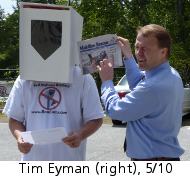

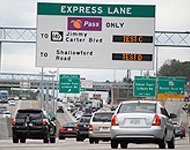

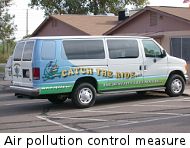

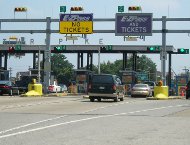


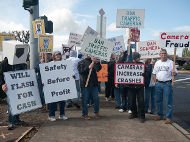
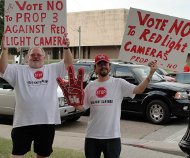

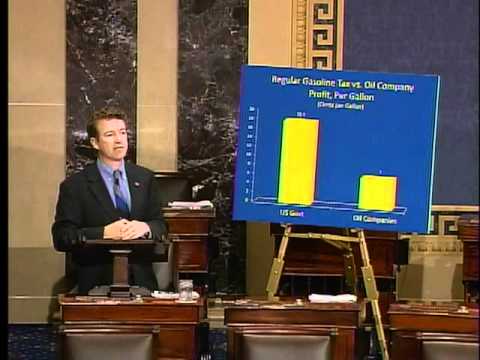
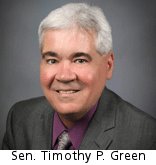

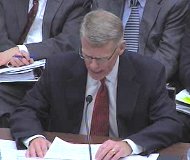

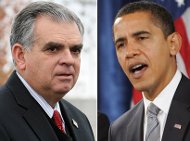
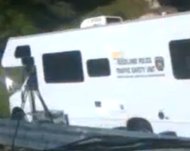
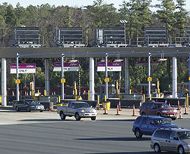
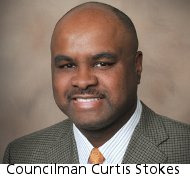
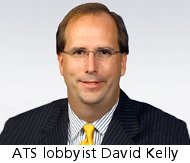
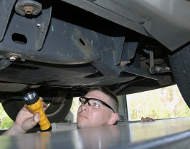
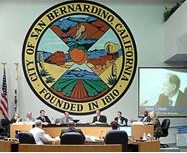




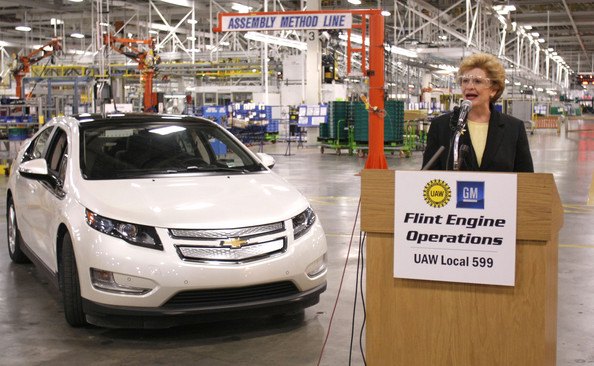
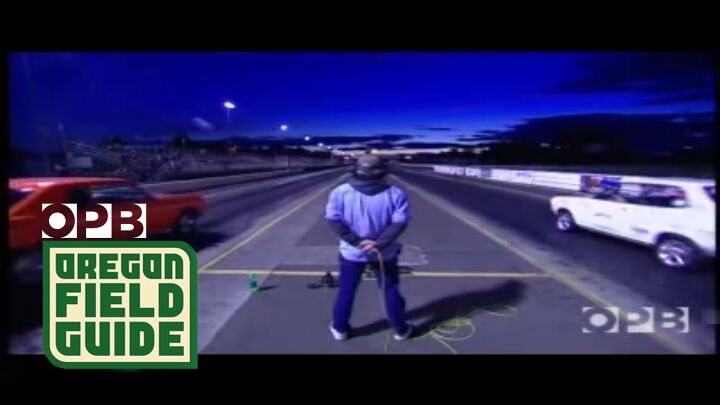
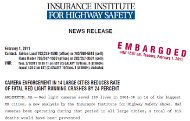
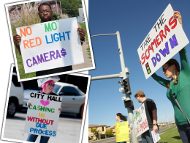
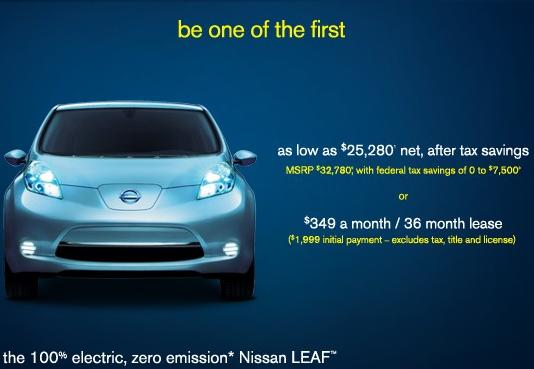



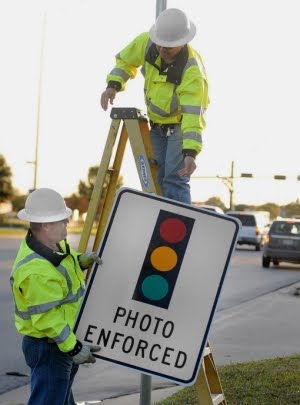
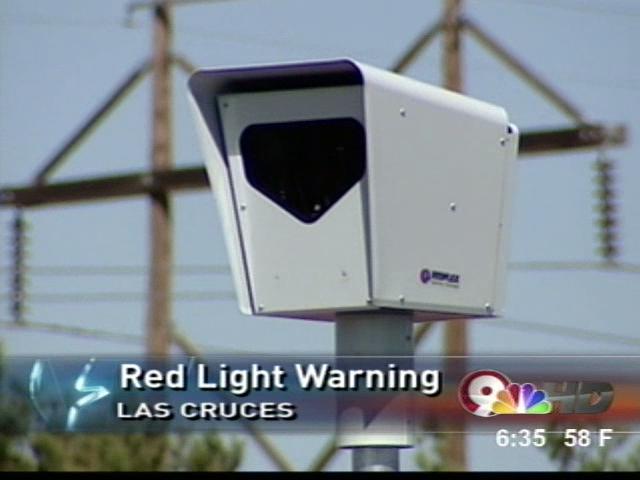
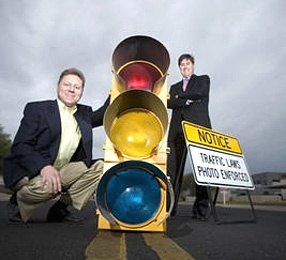
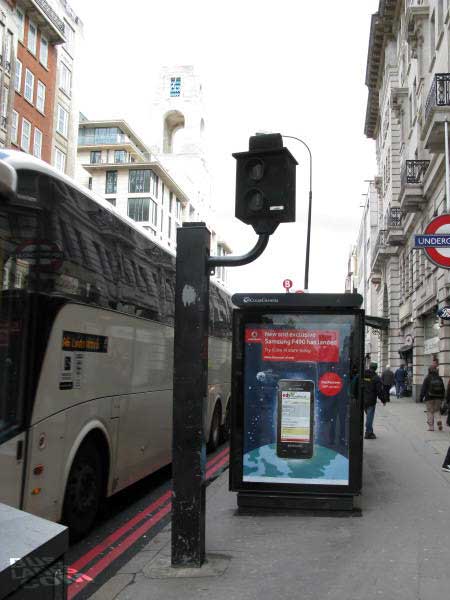

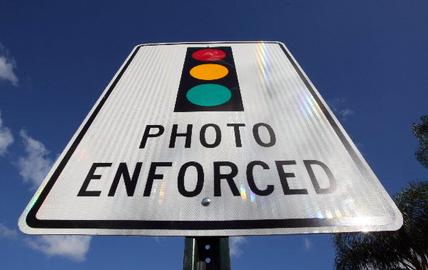



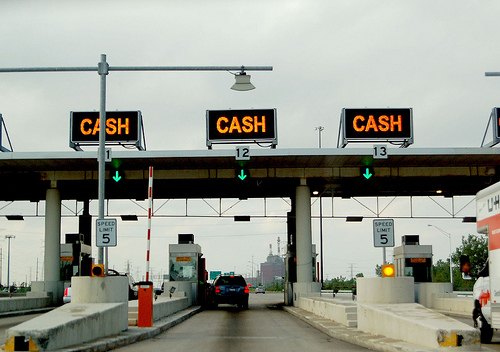













Recent Comments